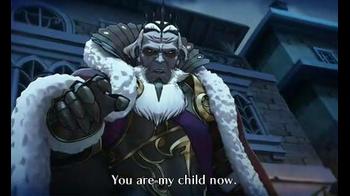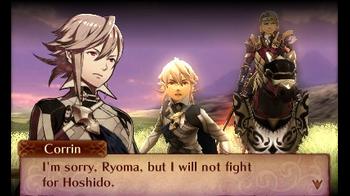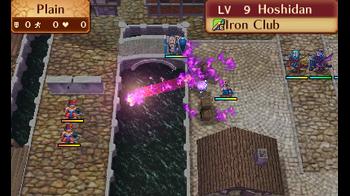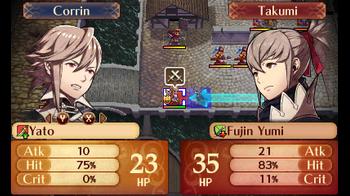
Fire Emblem Fates: Conquest Review
After the ludicrous success of Fire Emblem Awakening a sequel seemed inevitable, even if one was never initially intended. What we actually get is a bit stranger, especially for a fairly niche Japanese Strategy RPG series: we get three. It's not a bad time to be an RPG fan, huh.
The obvious comparison to make with Fire Emblem Fates' three different games - Birthright, Conquest and the DLC-only Revelations - is Pokemon. There's quite a bit different to the Pokemon approach, however, with the main point of the three games being a vastly different story. The core combat and gameplay mechanics are identical across all three games, but each has a unique story, many unique characters, and different combat encounters that take place in different places and have different criteria for victory and so on.
Here's what you really need to know: Birthright is designed for newcomers to the Fire Emblem series, or indeed to strategy RPGs in general. It's designed to be a gateway drug, and for better or worse features more simple and accessible gameplay. Revelations is, as the name suggests, a wildly different twist on the story.
Conquest, the subject of this review, is the inverse of Birthright: It's a more hardcore Fire Emblem experience for fans who know exactly what to expect from the series and want a solid challenge.
Conquest's design is more comparable to the vastly successful Awakening, whereas Birthright is more of a watered down version of that experience. Birthright is no slouch of a game, but its pared-back design brings with it its own challenges, which are detailed in our review for that version.
All three games open the same way - you create your character from various pieces and are then thrown into a prologue. You've lived in the land of Nohr for as long as you can remember, but through the course of the prologue, which is identical across the releases, you learn that as a child you were kidnapped from another country, Hoshido, and are urged to return.
This is where the Fire Emblem Fates universe splits: the player can return to their original homeland, Hoshido, or stick with Nohr, who actually raised you. Going one way will in some sense leave the other hostile, and with this being a Fire Emblem there's of course going to be conflict. Conquest sees Corrin - the default name for your hero, but you can name them whatever you fancy - stick with the family that raised him but in doing so betrays and becomes an enemy of his birth family.
The core gameplay of the Fire Emblem series is shared between all three of the titles. They're tactical RPGs with battlefields divided into chess-style squares. Every move you make is important, and it's vital to try to line up your characters in a way that's most likely to give you decent coverage of the battlefield and not leave weaker but vital support units without the cover they so sorely often need.
The 3DS seems absolutely perfect for this series, and a new game reaffirms my belief that the machine itself helped the series find huge success with Awakening. It just compliments Fire Emblem well: grid-based movement means you don't need anything but a D-Pad, while the bottom screen is home to everything you need to know - character information, attack success predictions, the works. That leaves the top screen clear for a more absolute battlefield view. It's just smart. Pretty much all the features from that game are present, from multiplayer to various single-player nuances. All these elements worked well in Awakening, and they continue to do so in this iterative sequel.
While Birthright is often so simple in terms of its approach to combat scenarios in order to remain streamlined, Conquest takes the Fire Emblem series to its natural maximum, or close to it. Here is a version of this combat that becomes far more complicated, with battle scenarios involving a variety of different win and loss conditions, far fewer mega-powerful god-style units and generally far more tense battle scenarios.
There's nothing quite like sweating it and praying you don't lose a character as you see off waves of enemies while defending a position, and that feeling is drastically enhanced in this version of Fates. Opportunities to grind have been stripped away too, meaning you're constantly facing battle right on the cusp of how powerful you need to be, with bad results a near-constant threat.
It's optional, but classic difficulty adds back in the iconic permanent death that was a staple of older Fire Emblem games, and playing Conquest this way made it a truly nerve-fraying experience. The tension in combat adds to the rest of the game's systems, so when characters start having inter-personal relationships and even having children based on who they're most often paired with by you on the battlefield there's a new level of panic. Some of the cast are quite endearing and you really don't want to lose them, and that makes every decision, from combat-calls to how you equip people, all the more weighty.
There's a greater degree of customization around characters in general - levels are now notably shared across every class a character can occupy, making careful micromanagement of each character's skills vital. Where mechanics have been removed, such as weapon durability, it feels to be for the sake of reducing tedium, with nothing of worth lost.
Speaking of characters, even they aren't quite as clear-cut as one might expect. Playing Birthright sees the Nohr cast as morally-dubious stereotypically evil villains, but in Conquest you, of course, are on their side. It's plainly obvious that some of the characters here are evil, but the case for others isn't quite so clear-cut, and in this playing Conquest actually made me retroactively appreciate aspects of Birthright more. Fire Emblem has never been about moral quandaries, but the series at last represents an interesting little wrinkle of war: that it's rarely quite so black and white as 'good guys' and 'bad guys'.
The truth is that Conquest isn't really all that different to Awakening, but that's a hard thing to complain about. Awakening was a hell of a game, and so too is this. In some ways it's even superior - there's subtle changes to the game's already-excellent presentation, a wider variety of mission objectives than ever and generally more satisfying combat beats. Equally there's a few bits that are worse - things like offspring are poorly justified in the narrative where in Awakening they were central, and I find none of the cast to be as memorable as Awakening's best.
This is absolutely the better of the two retail Fire Emblem Fates releases, and while I could muse on the differences between this and Fire Emblem Awakening for an age, the verdict broadly pans out as Conquest being on balance is equal to Awakening. That's an achievement in itself - it was, after all, named our favorite RPG of 2013. Conquest lives up to that legacy where Birthright doesn't quite manage to.



